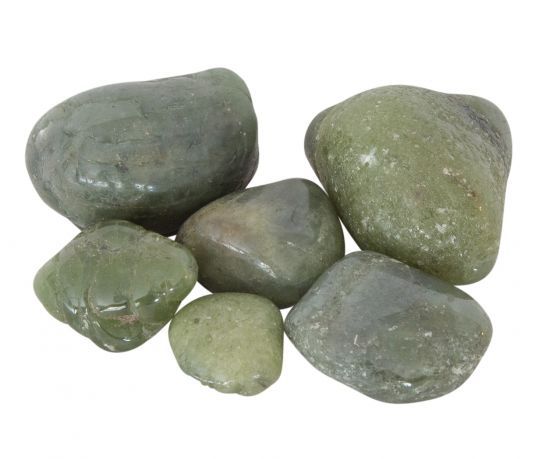We use cookies to make your experience better.
Peridot (Olivine) (bag 500 grams) Norway rare! "made in Germany"
- Buy 3 for €265.00 each and save 10%
The mineral olivine (Peridote) is a nesosilicate with the chemical formula (Mg, Fe) 2SiO4, where the end members between magnesium and iron are formed by the mineral series forsterite (rich in Mg) and fayalite (rich in Fe). Olivine has an orthorhombic crystal system and it crystallizes in a slightly flattened form but can also be solid or granular. It breaks conchoidally and is somewhat fragile. The hardness of olivine is between 6.5 and 7. The average density is 3.32 kg / l and the mineral has a glass luster. Usually it has an olive green color (hence the name) but it can also be reddish due to the oxidation of trivalent iron. It is transparent to translucent. Olivine is found as a rock-forming mineral in igneous mafic rocks and in certain metamorphic rocks. It has also been discovered in meteorites and has been traced on Mars by the US space probe Mars Odyssey. The Mars Exploration Rovers have further confirmed its presence. Olivine is formed in magma that is rich in magnesium and low in silicates (silicon dioxide). It is an important mineral in rocks such as gabbro, norite, the mantle rock peridotite (dunite) and as small crystals in basalt. The metamorphosis of impure dolomite or other sedimentary rocks with a lot of magnesium and few silicates has also been found to form olivine. Olivine is widely used for facade cleaning. Small olivine grains are blasted on the wall together with water, so that the contaminated layer is removed. Olivine is better suited for this than ordinary grains of sand, because of its greater hardness. Due to the intensive search all over the world for inexpensive processes to bind CO2 to minerals, olivine has come to the fore. Olivine is a basic rock. It reacts relatively quickly with the (acidic) CO2 in the atmosphere. Crushed olivine will deteriorate completely within a few years, depending on the grain size. To bind (neutralize) the CO2 that 1 liter of petroleum produces during combustion, a little less than 1 liter of olivine is needed. The reaction is exothermic. The end products of the reaction are, depending on the composition of the olivine, magnesium carbonate or silicon oxide (sand)
| Dimensions | 10-30mm |
|---|












